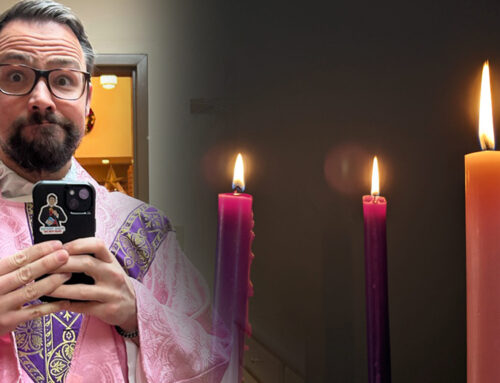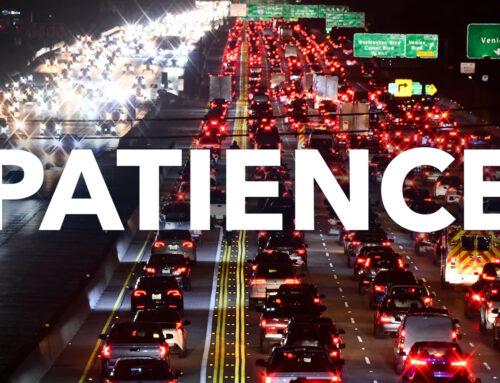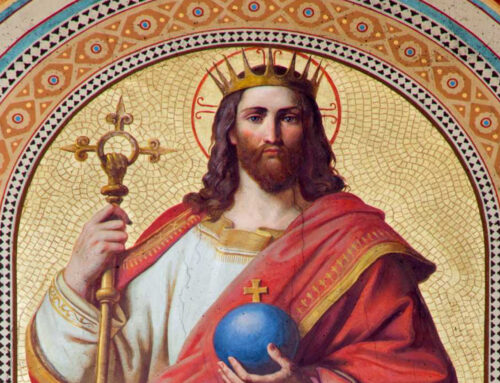In our second reading this weekend, St. Paul said this:
“Whatever was written previously was written for our instruction, that by endurance and by the encouragement of the Scriptures we might have hope.”
I’d like to reflect on this virtue of hope for a few minutes.
The Catholic philosopher Josef Pieper once wrote that hope is “the proper virtue of the ‘not yet.’”
What does he mean by that?
Well, we’re “not yet” saints in heaven, right?
But we’re also “not yet” doomed to eternal separation from God…
So hope remains!
But it all hinges upon that grain of “not-yetness” right? — that little nugget of not knowing the final and complete outcome is what holds us all in suspense and makes our lives worth living…
That’s where hope can actually happen. “Hope that is seen is not hope,” as St. Paul tells us elsewhere in Scripture.
Because of this necessary “not-yet-ness” of true Christian hope, there are actually two ways that we can become hopeless.
The first way to be hopeless is the one we usually think of right away:
Despair.
Despair runs contrary to hope because it assumes that we’ve already lost definitively. That the world is already ruined beyond repair. That our behavior is never going to change. That we can never be healed… never freed from our addictions. That God never listens to our prayers. That we will never have the relationship we want to have with Him. That we will never move forward. Never reach the goal.
It’s already decided… and it’s guaranteed to be bad.
Despair is such a horrible burden. It’s so painful. And everything seems blurred when seen through the lens of despair.
Think of the image we heard in that first reading from the prophet Isaiah of the “stump of Jesse.” A stump looks altogether hopeless, right? We might reasonably despair of a chopped off tree trunk. Israel had all but despaired of ever seeing the Davidic kingdom truly restored — It looked like a dead stump for over five hundred years.
But when we see that stump through the eyes of hope and we reject despair, we know that the story isn’t over. We can see that God promised His people that something living and good would eventually sprout from that stump of Jesse! A savior would come! The Messiah would arrive! And he would be wise, understanding, strong, all-knowing, God-fearing. He would judge rightly and bring about everlasting peace!
Despair is not of God… And we have to reject it wherever we see it creeping into our hearts.
Think of John the Baptist, the spokesman of the Lord:
His main message is REPENT! If you think about it, this message is a rejection of despair! Why would John the Baptist bother exhorting people “Change your ways!” “Turn around!” “Shift your minds away from sin, and toward the mind of God!” … Why would he bother preaching that message if he didn’t believe there was solid hope for it to actually happen? For people to really be transformed and made new?
Sometimes we think the word “REPENT” is a message of doom, gloom and despair, but in actuality, it’s the only hope any of us have.
The world tells us not to bother about our faults, failings, and sins. That we are what we are. We can’t help it.
John the Baptist has a much better message. He tells us: “Actually, you are free to change — you can repent and be made whole again. You can become holy! There is possibility with God. He is the Lord of surprises! So don’t despair!”
Gandalf, from the Lord of the Rings says this:
“Despair is only for those who see the end beyond all doubt.”
The fact is, we don’t see the end beyond doubt! In this life, we can never have that kind of perfect knowledge of our future failure!
So within that wonderful “not-yetness” …….there’s hope!
[…]
But here’s the flip side to that truth—
We also don’t ever have perfect knowledge of our future success!
This brings us to the second form of hopelessness:
Presumption.
Presumption is kind of the opposite of despair. It is when we assume that we’ve already secured absolute victory. That everything is guaranteed to be positive for us in the end. It is a kind of overconfidence in the sense that we presume that it’s already a done deal. We might as well be in Heaven already partying with the angels, because it’s a lock. No questions asked. No concern whatsoever. No possibility of losing salvation.
Presumption is not of God. And we have to reject it too…
Presumption comes up in confession a lot. A lot of people “presume” that there’s nothing really to worry about — that they can just go to confession after they sin, so they sort of give themselves permission to fall again and again.
This is pride, yes. This is arrogance, yes. But believe it or not, it’s also hopelessness! Because… it is presuming upon God’s mercy. It’s presuming that God “already” has let us off the hook more or less… and that we’ll surely have enough time to get to confession! It’s presuming Jesus won’t return for the Final Judgment before we make up our mind to stop fooling around with sin and finally be reconciled with God and the Church!
Listen again to John the Baptist’s warning in our gospel this weekend: “Do not presume to say to yourselves, ‘We have Abraham as our father.’ For I tell you, God can raise up children to Abraham from these stones.”
We can’t fall for that trap of presumption and think comfortably to ourselves: “You know, I’m a good Catholic. I make it to mass most weekends, and I learned my Catechism back in the day. I’m sure I give enough money to the Church. I’m sure I’m ok. ……I’m in.”
Jesus’ words come to mind here: “Not all who say to me ‘Lord Lord’ will enter the Kingdom of Heaven, but only the one who does the will of my Father who is in Heaven.”
We would do well to heed the Baptist’s warning: “Produce fruit, therefore, as evidence of your repentance!”
Why presume when we can instead HOPE boldly, and say:
“Lord, I trust You. I believe in Your promises. Life is hard, and I’m not perfect. I’m trying to do everything I can, with the help of Your grace, to repent. I don’t always see how things are going to turn out good, but You are worth this uncertainty. I won’t jump to conclusions — I won’t despair or presume. I will have hope instead.”
While we live on this earth — we are not finished yet. We are all works-in-progress.
We know what God has promised us. And we know that He is trustworthy. We know that He has “plans for us… plans for welfare and not for evil, to give us a future and a hope.”
So let’s listen to John the Baptist crying out in the wilderness: “Prepare the way of the Lord!”
“Prepare the way of hope!”
Do not despair. Do not presume. Instead, ask God for the gift of Hope.





Father Anthony:
Just found your web site and it is really good. Enjoyed your homily from last Sunday. Looking forward to more gems from you.
A fellow Steeler fan!